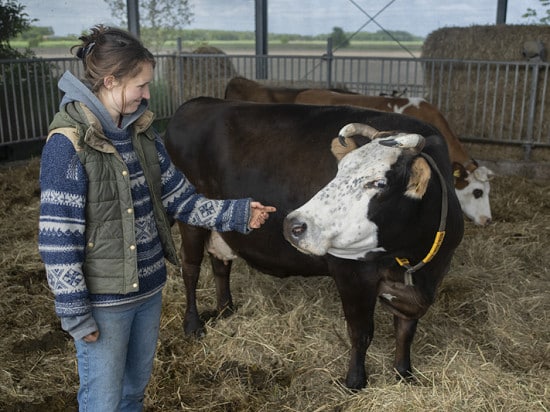Ditte Charpentier (24)

“After secondary school, I worked on organic farms abroad for three years. So I was used to leading a highly active life. I can’t sit in school from nine to five. And here at Warmonderhof, theory and practice are also split fifty-fifty. That’s perfect for me.”
“Running a farm together gives more freedom”
Ditte Charpentier (24) is a third-year student at Warmonderhof at the time of this interview. She has chosen the livestock farming major.
“After working on organic farms for three years via the Wwoof organisation, I felt the need for more depth. I was missing the ‘why?’ a bit. I wanted to know more about working. And because I believe we should take better care of our soil and animals and our living environment, I soon ended up at Warmonderhof, because this school is the only one that trains students in this way.
I certainly don’t want to become a farmer on one of those two-hundred-cow farms. My choice would be for another form of livestock farming. Or rather, the mixed farm. And within that, I like the livestock farming discipline best. I think it’s cool to be completely self-sufficient in cattle care, with its own feed and straw supply, and manure that’s spread over the arable land. It’s the interaction that’s so cool. It’s great that it’s possible.
Many opportunities for entrepreneurial work
“Here at Warmonderhof you get a lot of opportunities to help you develop into an entrepreneurial farmer. In your third year here, for example, you spend a year working within the same industry. So you get to experience what it’s like to have your ‘own’ cows. Of course, the cows aren’t actually yours, but that’s how it feels. It’s allowed here, and it’s only possible because you’re also living here at the same time. You do your practical training with the cows, live next to them and even have your theory lessons with them in the barn or in the meadow. You really get to know farm life because you get to actually do it. Now that I’m in my third year, and have been here for three years, I find I’ve got an increasingly intimate connection with the farm. Learning by doing, that’s what it is. So it’s possible to add even more connection and depth to your training.
Creating freedom outside farming
“I think a lot about my future. It would be great if I could build my own mixed farm, focused on community farming, where everyone’s responsible for their own industry. I want to do it in collaboration with others, I like that. I’m more focused on forage crops than field vegetables. So if there’s someone who’s passionate about vegetables, they can take charge of that.
“I did my external six-month internship at Plaw Hatch Farm in England, also a mixed farm. One person was responsible for arable farming, another for cattle farming, and still others took care of the vegetable garden, dairy processing and the shop. That’s where I discovered how much pleasure I got from working together and helping each other. And that way you also have some free time. I don’t have to be a farmer seven days a week, but in practice that’s what you are if you run a livestock farm on your own. By working together, you give yourself freedom outside farming because you’re not the only farmer involved.”